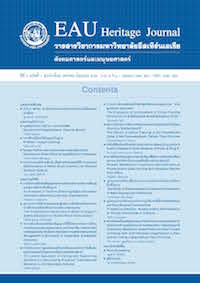โมเดลการศึกษาและกรอบมาตรฐานคุณวุฒิแห่งชาติ
Keywords:
โมเดลการศึกษา, กรอบคุณวุฒิแห่งชาติ, Educational Model, National Qualification FrameworkAbstract
การศึกษามีการพัฒนาอย่างต่อเนื่องเพื่อสนองต่อความต้องการและการเปลี่ยนแปลงทางเศรษฐกิจและสังคม ความท้าทายของการศึกษา คือ การพัฒนาศักยภาพของคนให้สามารถพัฒนาตนเอง สังคม และประเทศให้เจริญก้าวหน้า ความมุ่งมั่นในการพัฒนาการศึกษาเพื่อมาตรฐานและความสอดคล้องต่อความต้องการของตลาดแรงงาน รัฐบาลได้ประกาศ พระราชบัญญัติการศึกษาแห่งชาติโดยความรับผิดชอบของกระทรวงศึกษาธิการเพื่อใช้เป็นแนวทางการพัฒนาทรัพยากร มนุษย์ บทความนี้นำเสนอประเด็นปัญหาของการศึกษากับมาตรฐานผลการเรียนรู้ และแสดงอีกหนึ่งมุมมองเพื่อสะท้อน การพัฒนาการศึกษาอย่างยั่งยืนด้วยโมเดล 4+1 ของการพัฒนาการศึกษาอย่างยั่งยืน ซึ่งประกอบด้วยผู้เกี่ยวข้องกับ การศึกษาและนโยบายการศึกษา กระบวนการบริหารจัดการการศึกษา การประยุกต์ใช้เทคโนโลยีสารสนเทศเพื่อการศึกษา และสภาพแวดล้อมทางการศึกษา เช่น มาตรฐานและคุณภาพการศึกษา ความเป็นสากลและการใช้ภาษา ซึ่งเป็นปัจจัย ช่วยสนับสนุนการพัฒนาการศึกษาให้บรรลุผลตามเป้าหมาย ส่วนกรอบมาตรฐานคุณวุฒิแห่งชาติเป็นมาตรฐานการศึกษา อันหนึ่งในส่วนของสภาพแวดล้อมทางการศึกษา เพื่อใช้เป็นแนวทางในการพัฒนาการศึกษาไทยทุกระดับชั้นในสถาบัน การศึกษาต่าง ๆ ให้ผู้สำเร็จการศึกษาในสาขา/สาขาวิชาเดียวกันมีคุณภาพขั้นต่ำใกล้เคียงกันและสามารถก้าวสู่มาตรฐาน การศึกษาระดับสากลได้
Educational Model National Qualification Framework
Education has been continuously developed to support the needs of social and economic development. The challenge of education is to keep people self-developed for their own society and country growth. Education development must conform with the needs of market place. The Thai government has declared the national education laws, thus becoming the responsibility of the Ministry of Education. This law is used as a guideline for human resource development. This paper presents the problem issues of education and standard learning outcome, and the point of view of an education development model called 4+1 model of sustainable education development. Such a model is composed of an education stakeholder and policy, an education process management, the use of educational information technology, and an education environment, such as an education standard and quality, globalization, and languages. The smart management of these components will help the achievement of education development. In addition, the National Qualification Framework (NQF) which is one of educational environments is employed as a guideline for Thailand’s education development of all levels and for all educational institutes. This will guarantee that any graduates with the same program from different educational institutes will have the same academic standard and will be able to compete with the educational world benchmark.





